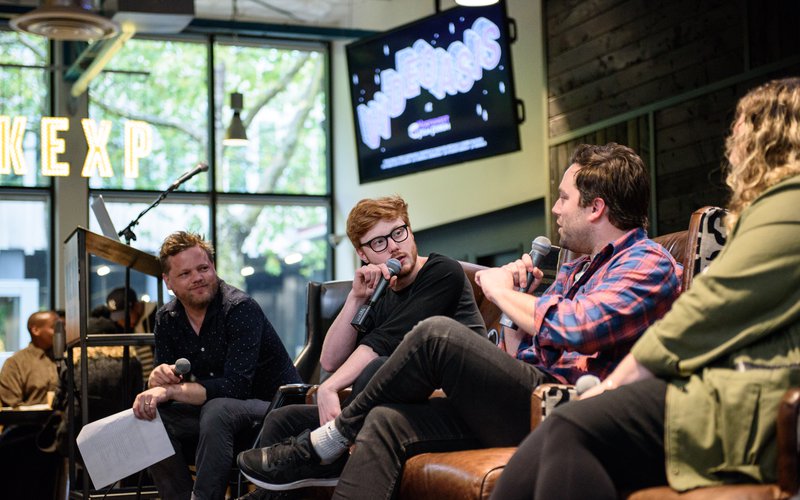
KEXP, Upstream Music Fest + Summit, and MoPOP have partnered together to present Mastering The Hustle: a new panel discussion with six annual events, tackling a different topic to help emerging artists make better decisions earlier in their careers. Throughout the series, we’ll be discussing everything from how to get airplay, legal and licensing, healthcare for artists, and promoting your brand.
Music festivals have exploded. Whether it’s Coachella, Lollapalooza, or Austin City Limits, these massive events are becoming a destination for music fans and a huge opportunity for artists to get exposure to massive audiences. Just in the Northwest alone, we’re host to numerous festivals that range from big budget productions to DIY experiences. Getting booked is a goal of many artists, but how do you make it happen? And how do you make your set memorable once you get on stage?
In our fifth installment of the Mastering The Hustle workshop series, we invited a panel of Seattle festival bookers, curators, and artists to shed light on the artist selection process and how to make a memorable performance. This series is in conjunction with Upstream Music Fest + Summit, MoPOP, and KEXP’s Artist Education Initiative — a new program dedicated to providing educational resources for local artists. Seattle musician Grant Eadie, who performs as Manatee Commune, kicked things off with his experiences getting booked and playing festivals. Later on, KEXP DJ Troy Nelson (who also helps book West Seattle Summer Fest) lead a panel discussion with Sasquatch! Music Festival’s Adam Zacks, Upstream Music Fest’s Meli Darby, and Capitol Hill Block Party’s Eli Anderson.
Festivals From a Musician’s Perspective
Grant Eadie opened up the discussion by giving a keynote on his experiences playing festivals as Manatee Commune. Having played festivals over the past three years, he says he’s experienced challenges and successes. But before getting into what it’s like being on the stage, he was able to open up about what goes into getting booked in the first place. Eadie stressed that these were just tactics that worked for him and that other might have different experiences. But for him, it all starts with exposure.
“People need to hear your name at least 100 times before they can get excited about booking you,” Eadie said.
Eadie stressed the importance of getting yourself out there. It means playing shows, meeting everyone in town you can who works with music, and working to get your name published in magazines and blogs. He gave an example of bookers discussing artists and how having your name published three or four times can help give legitimacy to your act.
He also went in-depth on the value of creating a “résumé” of your accomplishments as an artist. This includes press photos, artists you’ve opened for, and anything else notable that you can pack into an email. Going a step further, he suggests including a release plan on what you plan to do next. It’s something he’s personally seen success with. He says it allows promoters and agents to see what you’re doing in the future and demonstrates that you have a vision for your project.
Creating a fan base, he says, is maybe the most important part. This part can be a bit of a mystery for artists, but Eadie suggests focusing on investing your energy into creating music that’s unique and that you’re excited about. The honesty and authenticity will show in your performance and potentially draw people in. It’s also a good idea, he points out, to release multimedia to help garner fans. Whether it’s making videos, getting creative with visuals in your live performance, or even killer album artwork, it can be the “wow” factor you need.
Your online presence is a big factor as well. Eadie says finding his “Twitter voice” was huge for him and something he’s still working on. He says it’s helped him connect with people in a more personal way.
“To be honest, it’s all about getting your name out, meeting the right people, and having the music that makes people excited,” he concludes.
Performing at a Festival
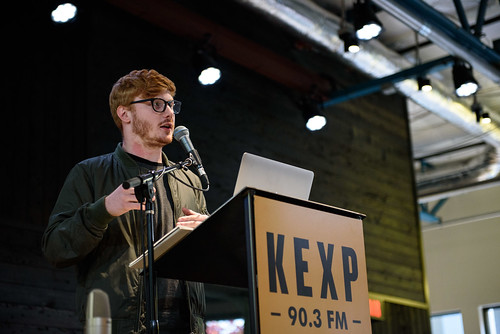
The festival stage can be unforgiving. One of the biggest mistakes Eadie says he made when he first started playing festivals was not preparing himself for what the stage would look like. Often stages are built the day of the fest, but you can request details from the festival prior. With all the moving parts, there’s always a chance there won’t be enough DJ boxes or you’ll have to work around a full kit that’s backlining the stage.
When you’re communicating with the festival prior to your performance, make sure they have all the details of your stage plot. You’ll also need to decide if you’re going to bring your full setup or if you want to pare it down. If you’re an electronic artist, sometimes it might make sense to minimize to just a laptop instead of a full band. Or it can mean taking a smaller drum kit than your band might typically use. Just try and keep it as simple as possible. The logistics at a festival can be, as Eadie puts it, “insanely complicated.” The crew may be stressed, so you need to make it as easy as possible for them and yourself. After all, you’ll want to look relaxed on stage as well.
“One of the best parts of music festivals is that everybody is already having a good time,” he says, adding that it’s your job to make it easier for the audience to have a good time.
But more than just downsides, there are perks to playing a festival stage. Eadie says it gives you room to be creative. Check with the festival and see if there’s space for visuals or dancers. When he played the dance tent at Sasquatch this last year, he got the specs for the stage’s LED screens ahead of time and spent months figuring out how to get his visuals to fit perfectly on the stage.
You want to make your performance as special as possible. Eadie says you want to make the fans who weren’t there jealous and you want other booking agents who might be there or who will hear about your show excited about working with you in the future. That’s why it’s crucial to post on social media after your performance. Eadie said that hiring a photographer to shoot his sets at Sasquatch, Capitol Hill Block Party, and on tour has been a huge asset.
“Having somebody there to take very unique, specific photos that I could keep posting for weeks afterward to keep people talking about the performance, to keep people excited about the name, excited about the music, and to be able to look back on that and be like, ‘I was in that audience and I had such a good time that day!’ To be reminded of that experience… it was huge,” he said. After sets, he says it’s also good to walk through the grounds and thank promoters and bookers, taking advantage of a chance to make a personal connection with people.
Eadie says festivals are a “pain in the butt,” but worth it and a lot of fun. But he sees the most crucial work being done back home and in the studio. Because in the end, it all comes back to how you make your music and how you see your audience reacting to your music.
The Festival Booking Process
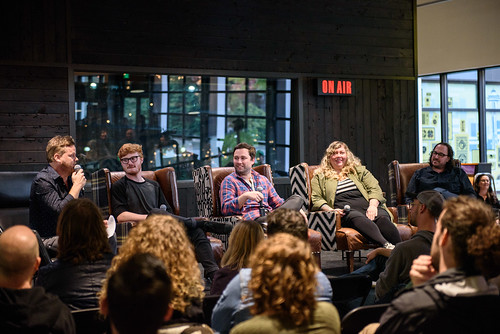
Every festival is different in how they book their lineups. Just with panelists on the Gathering Space stage, there was a breadth of different tactics at play. Capitol Hill Block Party’s Eli Anderson said that he and his team were already looking at 2018 artists before the 2017 CHBP even officially started. It’s something they look at year round. Since they also book Seattle venues Neumos and Barboza, they have a good idea of what a band’s draw is just from their show history. It’s a constant brainstorming and outreach process. They may have bands they want but just can’t get for a plethora of reasons. Run The Jewels, who headlined in 2017, were talked about for multiple years before they finally got booked. Sasquatch founder Adam Zacks echoed this sentiment, saying that his festival has also turned down some big name acts to stay true to the festival’s mission.
Upstream Music Fest, as curator and booker Meli Darby pointed out, has a unique model. The festival utilizes guest curators to help produce some of Upstream’s stages and venues. Some of these curators include fellow festivals, promoters, and venues. It’s a collaborative curation process.
“[Curators] bring a different authenticity and every event brings a different vibe,” Darby says. The festival’s priority is to make everything look and sound good for the artists so they have the best chance to succeed and curators help with this.
Upstream also holds open submissions for artists — submissions for 2018 are open from Nov. 3-24. Last year the festival had 1,300 submissions and 30 percent of the lineup was booked from these acts. The festival helped place at least one band from this batch on each curators’ stage.
Troy Nelson suggested artists start small. Instead of going for something like Sasquatch, research locally and see what smaller festivals you might be able to play like West Seattle Summer Fest. The more experiences like this you get, the better chance you have of moving up the festival ladder. Anderson also added that bands should research a festival prior and make sure they’re a good fit. For acts that are flustered about not getting bigger shows or festival slots, Zacks has some advice.
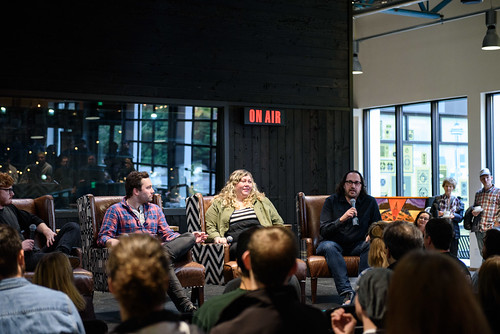
“If you’re a musician and you’re getting frustrated, put 99 percent of the focus on not being good but being great and being undeniable,” Zacks says. “If you do that, we will hear about it.”
He threw out an example of Seattle guitar-phenom Reignwolf playing a show at The Sunset Tavern that quickly became the talk of the town. He booked Reignwolf for that next year’s Sasquatch and the artist delivered on a truly memorable show that delivered on the promises of his hype. Focus on the art and the opportunities will come.
There wasn’t always a unanimous opinion on the panel on some aspects of booking. While Anderson said that having high quality video was hugely important to deciding acts, Zacks disagreed and says he looks at the music first and foremost. Darby threw in some crucial insight as well.
“In the digital age, content is key and it’s one of the most important things you can be doing now,” she said, noting that tastemakers and influencers are using data and analytics to make their decisions. She also added that artists shouldn’t be afraid to give a personal touch when reaching out to festivals. Anderson agreed, saying that sometimes a well done physical release can be a nice touch that will grab his attention — though digital submissions are also great and the standard.
Behind the Scenes of Festival Planning and Making It Easier
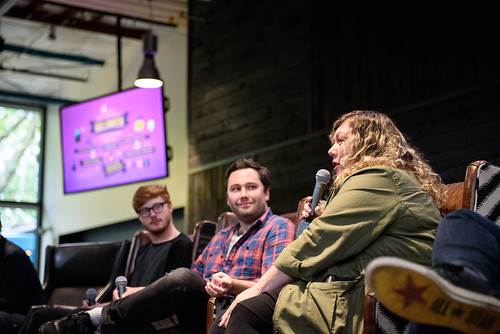
Before any bands ever show up at the festival grounds, there’s plenty of work beyond booking that goes on behind the scenes. Chief among these is negotiating contracts. One of the more frustrating elements, the bookers on the panel agreed, is arguing with artist reps on where their act will be placed on the bill and the font size on the poster — a problem that gets worse every year.
As an artist, it’s important to understand some of the key elements that go into making a festival run before you play. You might notice that your contract is a bit different than just a normal show. Typically contracts include a radius clause that limits when and where you can perform around the festival. For CHBP, Anderson notes that their clause is for 90 days and 200 miles around the area. For local bands, he says, this is negotiable but it’s expected for top-line artists. Mostly, he says, artists should be upfront with the bookers. There also may be a green room for you and there may not. Darby adds that unless you’re playing the mainstage you’re probably not going to get a backline. You have to be flexible given the scope of the event. Don’t try and add things last second and make your requests malleable to the fest’s needs.
While Eadie went into great detail on what it’s like to play a festival as an artist in his opening remarks, he was able to dig in deeper with the panel, noting what it’s like playing as a support act instead of a headliner.
“As a smaller artist, things move a lot faster,” Eadie says. It’s a much more raw experience and things can get broken in the process. Whether it’s dealing with the sun or the cold or other natural elements messing with your gear, you have to keep your guard up.
“You have to be emotionally ready to be in pain while you’re at a festival sometimes,” he adds, saying it does get easier each time he plays. Another factor is that, unlike at a club gig, you’re competing for an audience. The crowd can go to any other stage or the food trucks instead of your set. You need to find a way to keep them there with some sort of spectacle.
Key Takeaways:
Resources:
Local Northwest Festivals:
Ballard Seafood FestBig Bldg BashBumbershootCapitol Hill Block PartyDoe Bay FestFreakout FestMacefield Music FestivalSasquatchSummer Meltdown FestivalTreefort Music FestivalTimber/TimbrrrTuf FestUpstream Music Fest + SummitVanFestWest Seattle Summer Fest
In an ever changing industry and craft that can make it difficult for artists to have access to healthcare. In preparation for the workshop, we asked a few of our panelists the same question: What is one thing a musician can do to exercise self care?
Join us this Saturday, April 14, for a workshop on how to create safer spaces in the arts community.
KEXP, Upstream Music Fest + Summit, MoPOP, and The Recording Academy have partnered together to present Mastering the Hustle: a panel discussion with six annual events, tackling a different topic to help emerging artists make better decisions earlier in their careers. Throughout the series, we’ll b…
Get to know this Saturdays' speakers and the expertise they bring to the Mastering the Hustle panel
KEXP, Upstream Music Fest + Summit, MoPOP, and The Recording Academy have partnered together to present Mastering The Hustle: a new panel discussion with six annual events, tackling a different topic to help emerging artists make better decisions earlier in their careers. Throughout the series, we’…
Promoting your own music can be difficult. There's the logistical side of knowing how to do it and there's an internal struggle with artists on not wanting to lose authenticity. But not promoting because of these issues is only going to cause you more problems further down the road. Knowing how to …